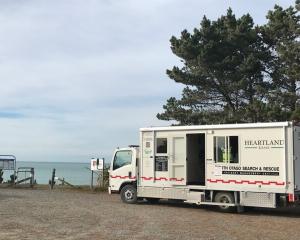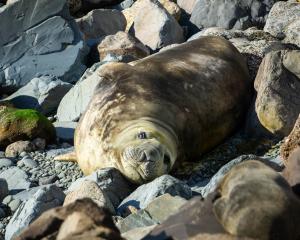
Coastal Otago biodiversity ranger Jim Fyfe praised the efforts of the up to 15 people who tried for six hours to save the stranded 4m female whale south of Moeraki, but he said the "very rare" event indicated that the lone whale was likely already unwell.
Although pilot whales often stranded along the shallow, gently sloping coast at Farewell Spit, the rugged Otago coastline would not easily fool the oceanic species’ echolocation, he said.
"In this coastline it is unlikely they are confused," Mr Fyfe said.
"With the surf running today, the noise of the surf alone should have been enough."
In 1989, 11 pilot whales stranded at Warrington Beach and in 1996, six pilot whales stranded at Waianakarua, but "when we get single pilot whales washed ashore on the beach here, they are [usually already] dead", Mr Fyfe said.
Freedom campers Teagan Ashworth and Glenn Kowalick, from Canberra, Australia, discovered the whale when Ms Ashworth went to the beach about 9am to take photographs.
She searched ‘‘whale rescue’’ on her phone and called the Department of Conservation (Doc).
Six tourists struggled unsuccessfully against the surf to free the whale, and then an instructor and four trainees from Dunedin scuba training company Dive Otago helped.
Mr Fyfe also called Moeraki runanga representative Myra Tipa and her son, Daniel.
Another attempt was made to shift the whale using a pontoon.
A Dive Otago trainee, who declined to give his name, said the group of about 10 managed to get the whale about 200m from shore, into water "over our heads", but the 5m waves prevented the group from bringing the whale past the breakers.
"We were trying to kick it out for ... over an hour," he said.
But the animal appeared "disoriented" and after another hour the animal again become stranded further along the beach.
Mr Fyfe said those at the beach made the decision to euthanise the animal "to minimise further suffering" after they had brought her to a depth "where she could have helped herself if she was able to help herself".
Mrs Tipa said after the animal was killed it was moved under the cliffs along the beach and a shallow grave was dug, a karakia was performed, and the whale was partially buried.
The whale would be properly buried at the site today, Mrs Tipa said.












